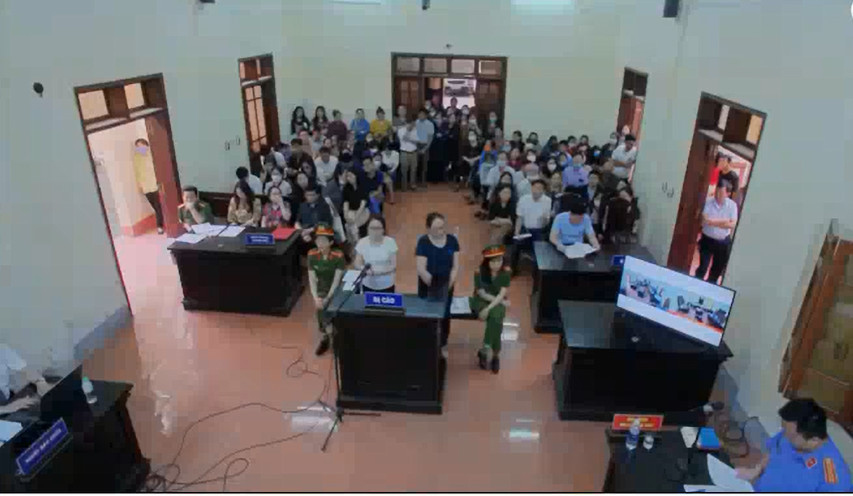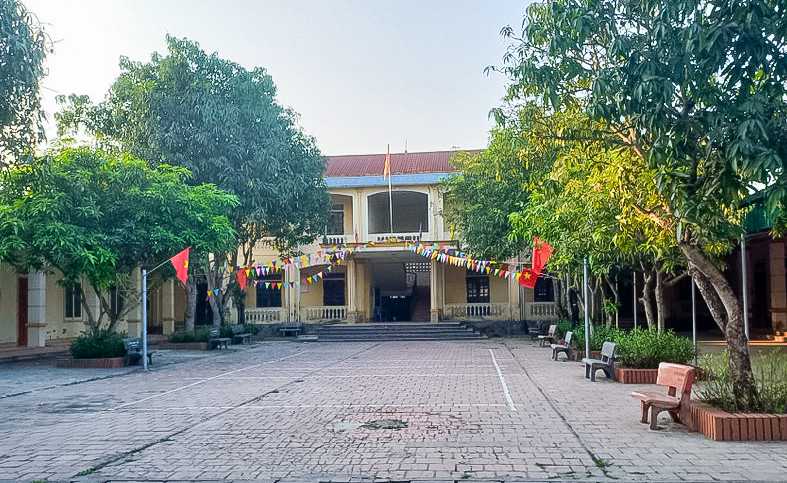Distinguishing between appeal and appeal in criminal cases
(Baonghean.vn) - According to the 2015 Criminal Procedure Code, the People's Procuracy at the same level or a higher level has the right to appeal all or part of the first instance judgment or decision to increase or reduce the severity of the sentence for the defendant and the litigant in both criminal and civil matters.
Regarding the case of Le Thi Dung - former Director of the Continuing Education Center of Hung Nguyen district, who was sentenced to 5 years in prison by the People's Court of Hung Nguyen district for the crime of "Abusing position and power while performing official duties", the People's Procuracy of Nghe An province recently issued an appeal against the first instance judgment, requesting the People's Court of the province to review the case in the direction of annulling the first instance judgment for re-investigation and re-trial.
Previously, defendant Le Thi Dung also filed an appeal against the entire first instance judgment of the People's Court of Hung Nguyen district.
So, what is an appeal, what is the subject of implementation, scope and time limit?
 |
The first instance trial of defendant Le Thi Dung - former Director of the Continuing Education Center of Hung Nguyen district for the crime of "Abusing position and power while performing official duties". Documentary photo |
According to lawyer Tran Thi Thanh Hang - Head of Phuc Tin Tam Law Office, Nghe An Provincial Bar Association,appeal trialis the act of the higher court directly re-examining a case or reviewing a first-instance decision where the first-instance judgment or decision has not yet come into legal effect and is being appealed or protested. The subject of the appeal or protest under the appellate procedure is the first-instance judgment or decision that has not yet come into legal effect.
Appealis the right of litigants as prescribed by law to request the Court directly superior to the Court of first instance to retry the case or review a first instance decision that has not yet taken legal effect.
Subject of appealare the participants in the proceedings, whose rights are affected by the judgment or decision of the Court or are the representatives, defenders, and protectors of the subjects whose rights are affected. Subjects with the right to appeal may only exercise their right to appeal within certain limits called the scope of appeal.
Scope of appealis the content limitation in which the appellant is allowed to request the Court of Appeal to retry the case or review the decision to protect his/her rights, the rights of the person he/she defends, protects or represents, according to Article 331 of the 2015 Criminal Procedure Code.
Appeal procedureas prescribed in Article 332 of the Criminal Procedure Code: The appellant must submit an appeal to the Court of first instance or the Court of Appeal. In case the defendant is in detention, the Warden of the Detention Camp or the Head of the Detention House must ensure that the defendant exercises the right to appeal, receive the appeal and transfer it to the Court of first instance that issued the judgment or decision being appealed.
The appellant may present the appeal directly to the Court of First Instance or the Court of Appeal. The Court must make a record of the appeal in accordance with Article 133 of this Code. The Court of Appeal that has made a record of the appeal or received an appeal must send the record or appeal to the Court of First Instance for implementation in accordance with general regulations.
Time limit for appealAs prescribed in Article 333 of the 2015 Criminal Procedure Code, for a first-instance judgment, it is 15 days from the date of judgment. For defendants and litigants absent from the trial, the appeal period is calculated from the date they receive the judgment or the date the judgment is posted according to the provisions of law. The appeal period for a first-instance decision is 7 days from the date the person with the right to appeal receives the decision.
 |
Hung Nguyen District Continuing Education and Vocational Training Center, where defendant Le Thi Dung used to be Director. Photo courtesy |
Protestis a procedural act of a competent person, expressing opposition to all or part of a judgment or decision of the Court with the aim of ensuring the trial is accurate and fair, and at the same time correcting errors in the judgment or decision of the Court.
Protests are made against judgments and decisions of the Court that have not yet come into legal effect or have come into effect but during the investigation, prosecution, and trial, errors or violations of the law are discovered, or new circumstances are discovered that may fundamentally or partially change the content of the judgment or decision of the Court that the Court was not aware of when issuing the judgment or decision.
Protests in criminal proceedings include: Protests under appeal procedures, protests under supervisory review procedures and retrial procedures.
Appealis the legal power given by the State to the People's Procuracy to protest against first-instance judgments and decisions that have not yet taken legal effect by the Court at the same level and the directly lower level when serious violations of the law are discovered, requesting the directly higher-level Court to re-try according to the appeal procedure to ensure the trial is lawful, strict and timely. The People's Procuracy at the same level and the directly higher-level People's Procuracy have the right to protest against first-instance judgments or decisions.
Subject of the right of appealAccording to the appellate procedure, the Procuracy at the same level as the Court that issued the judgment or decision at first instance and the Procuracy at the next higher level of that Procuracy are the Chief Procurator of the Procuracy. The Chief Procurator has the right to appeal according to the appellate procedure. When assigned to exercise the right to prosecute and supervise compliance with the law in criminal proceedings, the Deputy Chief Procurator has the right to appeal according to the appellate procedure.
Content of the appealThe decisions of the People's Procuracy at the same level and the People's Procuracy at the next higher level may overlap or supplement each other. The People's Procuracy has the right to appeal the whole or part of the first instance judgment and decision in the direction of increasing or reducing the severity of the case against the defendant and the parties in both criminal and civil matters.
Time limit for appealThe time limit for appeal by the People's Procuracy at the same level against the judgment of the Court of First Instance is 15 days, and by the People's Procuracy at the next higher level is 30 days from the date of the Court's judgment. The time limit for appeal by the People's Procuracy at the same level against the decision of the Court of First Instance is 7 days, and by the People's Procuracy at the next higher level is 15 days from the date of the Court's judgment.
According to Article 339 of the 2015 Criminal Procedure Code, when there is an appeal or protest, the entire judgment or decision of the Court has not been enforced. In the case of an appeal or protest of a part of a judgment or decision, the appealed or protested part of the judgment or decision has not been enforced. The part of the judgment or decision that is not appealed or protested will have legal effect and be enforced.
However, to protect the legitimate rights and interests of the defendant, the judgment and decision of the Court of First Instance shall still be enforced immediately despite appeals and protests in cases where the defendant is in temporary detention and the Court decides to suspend the case, not convict, exempt the defendant from criminal liability, exempt the defendant from punishment, impose a non-imprisonment penalty or a suspended sentence, or a prison term equal to or shorter than the period of detention. The Court's decision to apply compulsory medical treatment shall still be effective despite appeals and protests.
